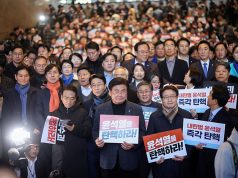
MANILA, Philippines — House Majority Leader Rodolfo Fariñas warned against any attempt by senators to push for separate voting on President Rodrigo Duterte’s request to extend martial law in Mindanao until the end of the year.
On Friday, a day before Congress convenes for the special called by Duterte, Fariñas said there should be no debate because “the Constitution is very clear and leaves no room for interpretation” that the decision on whether or not to allow the extension of martial law should be done through a joint vote of both houses.
Saturday is the 60th and last day of effectivity of Proclamation No. 216, which Duterte issued on May 23 after fighting broke out between extremist gunmen and government forces in Marawi City.
During a recent dinner in Malacañang, Fariñas said Duterte had proposed a 60-day extension. However, in the request he submitted to Congress, he wrote December 31.
But with some lawmakers saying the Constitution sets no limit to how long Congress can extend martial law, Speaker Pantaleon Alvarez has suggested it stay for the next five years or until the end of Duterte’s term, although the military has shot down the idea.
Article VII, Section 18 of the 1987 Constitution, which states: “Congress, voting jointly, by a vote of at least a majority of all its Members in regular or special session, may revoke such proclamation (of martial law) or suspension (of the privilege of the writ of habeas corpus), which revocation shall not be set aside by the President.”
“Upon the initiative of the President, the Congress may, in the same manner, extend such proclamation or suspension for a period to be determined by the Congress, if the invasion or rebellion shall persist and public safety requires it,” it adds.
Several senators earlier expressed concern that the constitutional provision for joint voting would render them irrelevant because of their number and said they might raise the issue during the special session.
There are currently 23 senators, although only 22 can vote with Senator Leila de Lima in detention, and 294 congressmen.
Fariñas warned of a possible deadlock if each chamber votes separately, adding that the Supreme Court would surely rule such a vote unconstitutional if it is contested.
Before Congress votes on Duterte’s request, lawmakers will be briefed by security and defense officials on the latest developments in Marawi. The lawmakers will also approve the rules for the joint session.
They said they would raise the matter of joint voting during the session.









